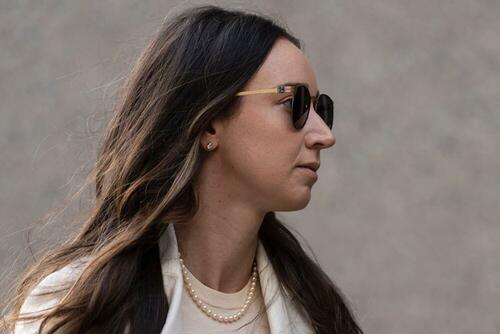Charlie Javice Gets 7 Year Jail Sentence For Defrauding JPMorgan
Charlie Javice, the founder of a startup company that sought to improve how students apply for financial aid and who is best known for defrauding the world's largest commercial bank (to be fair a few banks in China are bigger but they areall state owned), was sentenced Monday to more than seven years in prison for cheating JPMorgan Chase out of $175 million by greatly exaggerating how many students it served.
 Charlie Javice, Sept 29, 2025.
Charlie Javice, Sept 29, 2025.Javice, 33, was sentenced in Manhattan federal court for her March conviction by Judge Alvin K. Hellerstein, who said she committed “a large fraud” by duping the bank giant in the summer of 2021. She made false records that made it seem the company, called Frank, had over 4.25 million customers when it had fewer than 300,000, Hellerstein found.
Frank, which JPMorgan shut down in early 2023 after spending shit ton of money on without doing any due diligence, pretended to offer a tool to help students fill out their Free Application for Federal Student Aid, or Fafsa, which is required by most colleges in making financial aid decisions. A JPMorgan executive testified that the bank mistakenly thought Bank of America was also bidding for Frank. In reality, Capital One Financial Corp. withdrew a $125 million offer over regulatory, marketing and technological concerns on the same day JPMorgan made its bid for Javice’s company.
JPMorgan executives testified at trial that they hoped to gain millions of new, young customers through the Frank Deal, which made Javice a managing director and head of student solutions at the bank. But the bank launched an internal investigation after an email marketing push to Frank users yielded only 10 new checking accounts, they said.
Jurors heard from a data scientist whom Javice paid $18,000 to create “synthetic” user data to provide to JPMorgan during her negotiations with the bank. Frank’s chief engineer testified that he had refused to create such data for Javice because he feared it might be illegal.
The judge said Javice had assembled a “very powerful list” of her charitable acts, which included organizing soup kitchens for the homeless when she was 7 years old and designing career programs for formerly incarcerated women.
“You’re a good person,” Hellerstein told Javice. “You’ve done a bad thing, and I have to punish you.” In addition to prison time, he ordered her to forfeit $22.4 million.
 Charlie Javice, Sept 29, 2025.
Charlie Javice, Sept 29, 2025.“I am deeply sorry, and I am asking with all my heart for forgiveness,” Javice said through tears before her sentencing. “If it were within my power, I would never make the same mistakes again, not for money, not for recognition, not for anything.” Family members in attendance in the front row of the courtroom also wept as Javice spoke.
In court papers, defense lawyers noted that Javice has faced extraordinary public scrutiny, reputational destruction and professional exile, “making her a household name” in the same way Elizabeth Holmes became synonymous with her blood-testing company, Theranos. Which, considering both women are criminals, is hardly a shock.
Defense attorney Ronald Sullivan told Hellerstein that his client was very different from Holmes because what she created actually worked, unlike Holmes, “who did not have a real company” and whose product “in fact endangered patients.”
In seeking a 12-year prison sentence for Javice, prosecutors cited a 2022 text Javice sent to a colleague in which she called it “ridiculous” that Holmes got over 11 years in prison.
Prosecutors asked Hellerstein in a court filing for a stiff sentence, calling the crime a “brazen fraud” that she undertook to get JPMorgan to pay far more for her company than it was worth in the September 2021 deal. Javice’s lawyers on Monday suggested a sentence “in the neighborhood of 18 months.” They had called her actions a “single lapse in judgment” and claimed the loss was “not consequential” to a bank as big as JPMorgan.
Hellerstein largely dismissed arguments that he should be lenient because the acquisition pitted “a 28-year-old versus 300 investment bankers from the largest bank in the world,” as Sullivan put it.
“A fraud is a fraud, whether you outsmart someone who’s smart or someone who’s a fool,” the judge said, adding that he was focused on “her conduct, not JPMorgan’s stupidity.” Still he said JPM "have a lot to blame themselves” after failing to do adequate due diligence. He quickly added, though, that he was “punishing her conduct and not JPMorgan’s stupidity.”
Sullivan said the bank rushed its negotiations because it feared another bank would acquire Frank first.
A prosecutor, Micah Fergenson, though, said JPMorgan “didn’t get a functioning business” in exchange for its investment. “They acquired a crime scene.”
Fergenson said Javice was driven by greed when she saw that she could pocket $29 million from the sale of her company.
“Ms. Javice had it dangling in front of her and she lied to get it,” he said.
Given a chance to speak, Javice said she was “haunted that my failure has transformed something meaningful into something infamous.” She said she “made a choice that I will spend my entire life regretting.”
Javice, who lives in Florida, has been free on $2 million bail since her 2023 arrest. It means she has been wisely spending the money she stole from JPM.
At trial, Javice, a graduate of the University of Pennsylvania’s Wharton School of Business, was convicted of conspiracy, bank fraud and wire fraud charges. Having attracted clearly clueless investors like Apollo CEO Marc Rowan (not to be confused with Apollo's Leon Black who had a thing for even younger women), Javice was one of several young startup founders with elite backgrounds convicted of fraud in recent years. The group includes FTX’s Sam Bankman-Fried and Theranos Inc.’s Elizabeth Holmes.
Her lawyers had argued that JPMorgan went after Javice because it had buyer’s remorse.
* * *
For him. For her. Save the planet.
Loading recommendations...
